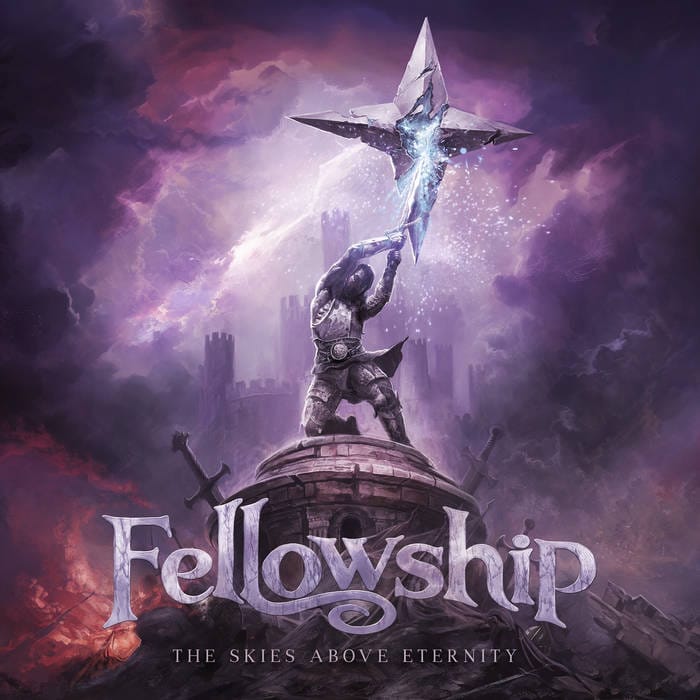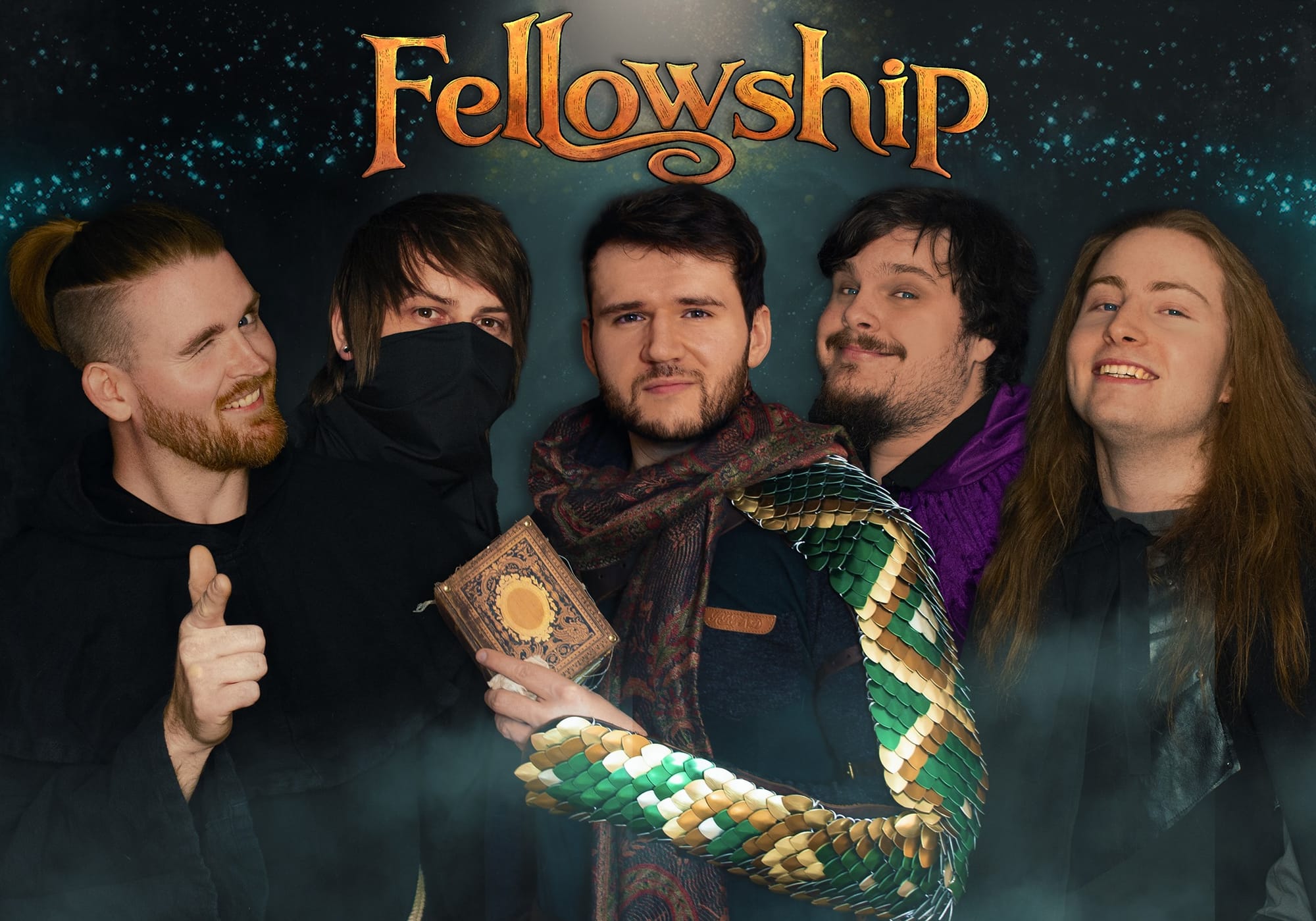Mental Health & Hobbit Metal: Q&A w/ Fellowship's Matthew Corry

Of all the different brands of heavy metal out there, power metal is the one I've gone back to the most over the different years of my life. Often flavored with fantasy and defined by astounding technical prowess on the musicianship side, it's the perfect fit for nerdy folk like myself who love rapid fire drums and epic guitar solos living alongside lyrics full of dungeons, dragons, magic, and more.
Talk to many power metal fans today, however, and you'll hear complaints of stagnation and boredom. "There are too many bands playing music that sounds the same." In light of that mood, it speaks volumes that the UK-based group Fellowship has been hitting so hard with fans of sub-genre. Releasing their first album, The Saberlight Chronicles, in 2022, Fellowship earned immediate praise for their "banger" songs and uplifting/mental health-focused take on power metal song-writing.
The band's second full-length album, The Skies Above Eternity, released last month on November 20th. Lead singer Matthew Corry was kind enough to answer some questions about the band, the new album, and its unique approach to power metal.

Stew Shearer: Your second album came out last month and has been getting a lot of positive response. How are you guys feeling in the wake of The Skies Above Eternity's release?
Matthew Corry: It's been pretty good, but we're the types of people who are always looking to what's next rather than what's just happened! I think that's how most musicians feel when they release something. We're stoked people love the music and we're really glad that the 'one album wonder' allegations are well and truly dead, but we're always aiming for the stars and we've got a lot of work left to do before we find ourselves getting there!
The release has gotten us some really cool opportunities though, like we're about to do our first European tour which we're super stoked about, and that's kind of the thing we're all-minds-on for at the moment. It's also really fun to see which of the non-single songs people gravitate to the most.
SS: Would would say is the biggest difference between The Skies Above Eternity and your first album, The Saberlight Chronicles?
MC: Musically, this album takes a lot more from Japanese power metal and Japanese musical ideas more generally. Cal, our lead writer, got super into that kind of music between the last album and this one, and since he's effectively our creative director from a musical standpoint, that often affects the flavors we bring to each record.
Lyrically, this album is a lot darker and kind of pushes the boat out a little on what we, at least internally, consider a 'Fellowship' narrative. The Saberlight Chronicles was so jolly and happy and unabashedly fun. This new record is a lot more embracing of the darker sides of life, the emotions that come before pushing through the struggle to victory.
Obviously it's still pretty positive but I don't think any of the songs other than maybe the opener would have fit well on the first record, and that to me is really validating - it means we've moved a little between records, and I think we're a band that very much wants to grow with each record rather than stay on a fixed point.
SS: Any personal favorite songs from The Skies Above Eternity?
My personal favorite is World End Slowly or Hold up Your Hearts (Again)! Cal really likes The Bitter Winds, Ed likes World End Slowly, Brad likes Dawnbreaker and Sam likes Victim - we're all pretty split!
SS: Can you tell me more about the origins of Fellowship? How did you guys first come together as a group?
MC: Cal and Sam met at a gig a few years before anything really 'began' for Fellowship, and started writing songs to a particular songwriting concept - everything begins with melody and harmony, played on a piano usually, and once that idea is set in stone the rest of the arrangement follows.
Then they spent like a year and a half looking for a vocalist! Eventually Sam found me on a Tinder-for-Musicians app, and we did a little try out with me writing lyrics to a song that they had the skeleton for... a couple drafts later we had Glint. The rest is history.
SS: Your Bandcamp profile says you "dress like Hobbits." Can we assume you're fans of The Lord of the Rings, then?
MC: When we first started out we had a big chat about what the band's brand should be. One of the consistent themes was that we wanted to have a uniform and not just wear t-shirts and stuff on stage, and another was that we liked the fantasy aesthetic generally, so The Lord of the Rings just naturally came up. This was even how we settled on the band name - once we said it, nothing else really seemed to fit!
SS: Power metal music can sometimes have a bit of a "every song sounds too similar" problem. One of the things a lot of people have enjoyed about Fellowship (myself included) is how distinct your songs sound from each other - even the faster ones! How do you manage that? Do you have any specific musical influences you draw on?
MC: This is a great question. I think there are a bunch of things that help us avoid that... Musically we take influence from EVERYWHERE. Three of the band used to be in a thrashcore band called Rezinwolf, Sam listens to a lot of Eurobeat and europop type songs, Cal's a big 80s pop guy as well as a true-blue power-metal-head, Brad listens to Judas Priest more than anyone I've personally ever met, and Ed comes from a bit of a jazz background. The melting pot of ideas is always pretty fresh.
Vocally and lyrically, I'm also not from power metal, but musical theatre and opera, with a little penchant for pop punk, so at pretty much every point in our musical process there's influences and ideas that are coming in that aren't purely within the genre, and that helps us pick-and-choose the best bits of power metal to keep, while also freshening up certain elements of the sound that don't necessarily fit us or our relationship to the music. Having 2 different primary songwriters (Sam and Cal) also helps a lot, because it means there's never just one 'voice' on each album, even if we only have one singer!
SS: There's no lack for power metal bands writing songs grounded in epic fantasy. Fellowship's music is fantasy-themed as well -The Saberlight Chronicles even has an accompanying novella- but tends to focus its lyrics around personal struggles rather than big things like "clashing armies" and what-not. Why focus your attention there?
MC: When I first joined the band, I did a really deep dive into the genre as a whole, and tried to look at it with as little preconception as I could. What I heard was an endless array of epic songs with uplifting sounds, but very few if any songs that mirrored those qualities in the lyrical content. I can see why - these big fantasy sounds really go with the dragons and fighting and adventure vibes, and that has a really solid place in people's lives. Those sounds also go along with feelings of validation, of courage, of self-worth and acceptance... and when I look at metal as a whole, not just power metal, I don't see a lot of space for that.
Metal is great - it's cathartic and very heart-on-its-sleeve musically in a way that very few genres ever get to be. Even if a lot of metalheads kind of dig the Viking hardman mettullll aesthetics, you can listen to any of the most deathy, hardcore bands and you'll find them singing or screaming about intense, personal struggles for the most part, and that's almost intrinsically vulnerable. Metal is oxymoronic in that way, and I think that's why it's so special to the people that live their own lives with elements of that juxtaposition between resolution and struggle, who might be protective of their vulnerabilities and so forth.
But with all that said, there's very little metal that provides a real space for what comes after that vulnerability and catharsis, for the acceptance and the healing and the.... 'insert psychologically healthy words here' kind of stuff. Power metal is happy enough to straddle that line in a way that isn't cringe or hard to listen to, and from the very first song we wrote - Glint - I wanted to try and explore that. Turns out people really, really liked it. Perhaps they needed it, I know I did.

